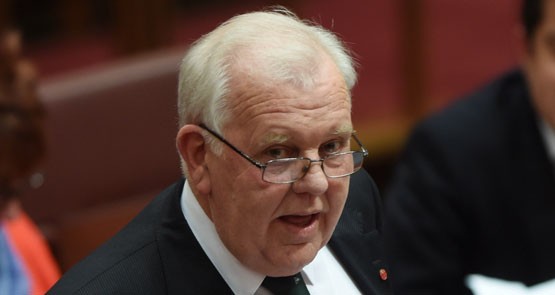
As federal parliamentarians prepare for the trek to Canberra to consider the government’s Australian Building and Construction Commission bill, one prospective Labor Senator’s plans for next week remain in limbo.
The situation threatens to leave Western Australia under-represented in the states’ house at a sitting that could determine the fate of current Parliament and the shape of the coming election.
Not for the first time, the source of Labor’s headaches is Senator Joe Bullock, who six weeks ago made the surprise announcement that he was resigning from Parliament in protest against his party’s enthusiasm for same-sex marriage.
With an election looming, Opposition Leader Bill Shorten moved quickly to secure the preselection for one of the most visible figures in indigenous politics, Pat Dodson — a choice that won acclaim as a break from the typical Labor careerist mould.
The Labor hierarchy presumed that would be the end of the matter, but as the weeks passed and the resumption of Parliament loomed, Bullock’s formal resignation was nowhere to be seen.
Only last Tuesday did Bullock announce that his resignation would be with the Senate President at some point this week, saying he had first wished to wrap up his parliamentary committee work.
But by this time, a procedural hurdle had placed itself between Dodson and the assumption of Bullock’s vacancy in time for parliament’s return.
Because the Senate was conceived as the states’ house, the Constitution decrees that vacancies arising through deaths and retirement are a matter for the relevant state parliament — a fact Australians were reminded of when conservative Premiers twice defied Labor in choosing replacements for its Senators in the lead-up to the 1975 supply crisis.
A successful referendum proposal in 1977 ensured the choice would henceforth be made by the party whose seat was being vacated, but the formal role of the state parliament in signing off on the process was left unaltered.
The problem for Dodson is that Western Australia’s state Parliament adjourned last week, and it is not set to resume until May 10.
A report in The Australian last week suggested the matter might be resolved through a constitutional escape clause that allows the Governor-in-Council — in effect, the state Premier — to fill a Senate vacancy when the state’s Parliament is not in session, effective immediately but to be ratified by the Parliament at a later time.
However, there’s a problem with this scenario, which is neatly emphasised by the unusual circumstances of next week’s sitting of federal Parliament.
As was detailed here when the Prime Minister delivered his double dissolution ultimatum three weeks ago, what is formally known as the parliamentary session is routinely confused in political discussion with the distinct concept of the parliamentary sitting period.
A session can be brought to end by prorogation, as Malcolm Turnbull did to ensure the timing of the Senate’s next sitting would be determined by the government rather than the Senate itself.
However, this does not apply to the present circumstance of the WA Parliament, which has merely adjourned. Officially speaking, it is still conducting a “first session” that began when it met for the first time after the 2013 state election.
As such, it would take an adventurous reading of the constitution to conclude that a Senate vacancy in WA could be filled at the current time other than by a joint sitting of the two houses of state Parliament.
Such a reading has, in fact, been taken on occasions in the distant past, with no harm done since the decisions were not challenged in court.
However, there are good reasons to think WA Premier Colin Barnett would, if pressed, prefer a more conservative approach.
A precedent was established in his own state in 1992, occasioned by the retirement of Jo Vallentine, who represented first the Nuclear Disarmament Party and later a newly established state-based GreensParty.
The then-state Labor government’s tardiness in replacing Vallentine with her ultimate successor, Christabel Chamarette, left the position unfilled for six weeks, which earned the government a stern rebuke in a motion passed by the Senate.
Among the factors at play was the advice of WA’s Solicitor-General that an appointment by the Governor-in-Council would be open to a legal challenge, on the grounds that “not in session” did not merely mean “adjourned”.
This view has been further endorsed by the Crown Solicitor of New South Wales in advice tabled in that state’s Parliament less than two years ago.
If Barnett plays it by the book, Labor will be left to hope that the government parties agree to negate Dodson’s absence through a pairing arrangement — an arena of parliamentary etiquette in which the Coalition has played hardball in the past.
Either way, Labor will be relying on the grace of its conservative opponents to ensure that it enters the field at full strength next week.








Labor will be relying on the grace of its conservative opponents. What a joke. What grace have these ideologically driven troglodytes ever shown. And we will see just how far down in the gutter Turnbull was with Abbott.
Cryptorchid.
Still waiting on an apology from the wretched nitwits who preselected Bullock.
@Paul Rodan +100..
PaulR & J/B – please don’t hold your breath waiting.
And it is not as if they have learned from this farrago – both majors will do the same again & again if it suits the err.. suits who manipulate and control the careerists eager to toe the/any Party line without thought, ethics or conscience.